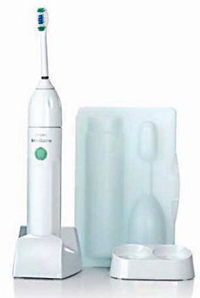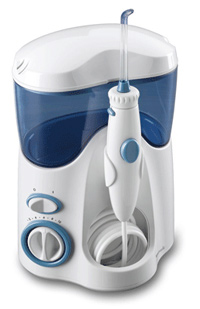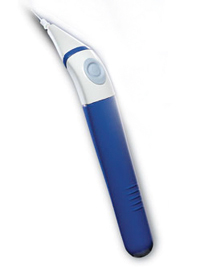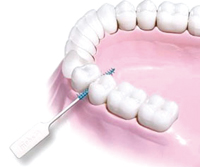Brushing teeth is an important hygiene measure in preventing dental disease, especially gum problems. Therefore one should be aware of qualities in an ideal toothbrush.
Here are some tips for choosing the right one for you:
- Brush heads should be small enough to reach all parts of the mouth and should have a flat brushing surface with a straight handle
- Always use a soft or a super soft [never medium or hard] nylon bristled tooth brush
- Brushes of any kind should not be expected to last very long and should be changed once in three months
- If you find that the brushes wear and splay out very quickly it is probably a sign that brushing is not being done correctly — probably force rather than care is being used.
Diet and dental health
A balanced and nutritious diet is good for your general and dental health. Without the right nutrients, your teeth and gums can become more susceptible to decay and gum disease. Sugar is one of the main causes of dental problems. The prevention of dental decay begins with cutting down the amount of sugars in all forms. Most people think dentists refer only to sweets and chocolates as the culprits. But there are other high sugar-containing foods as well.
Harmful carbohydrates include:
- All sugars [including honey]
- Soft drinks such as colas and lemonades
- Cakes, biscuits and puddings
- Jam and marmalade
- Chocolates, sweets and toffees
- Peppermint sweets [they are the most dangerous because people believe the peppermint taste to be “medicinal”. These sweets are almost pure sugar].
These sugars are not an essential part of our diet. Hence, reducing the total intake will not only benefit your teeth, but also keep a check on your weight. However, it is the frequency of sugar intake, more than the total consumption, which is important in influencing tooth decay. It is shown that the acid formed on the tooth in seconds from sugar might take 20 minutes to disappear from the mouth. Thus, small sugary snacks every two or three hours throughout the day will keep the teeth bathed in a dangerous acid state.
Children should have sweets only once a day [preferably during meal time] followed by an extra round of brushing. But, it is better to opt for sugar-free snacks.
Signs of common dental problems
You should visit your dentist if you have these warning signs:
- Long-lasting bad breath
- Your gums bleed when you brush or floss
- A tooth/teeth that is a little bit loose or shaky
- White or red patches in your mouth
- Mouth ulcers that don’t heal in 7-10 days
- Teeth that are sensitive to: hot, cold, sweet and pressure.
New devices
We all know that dental care involves a daily regime of brushing with fluoride toothpaste and flossing. But, we are unaware of the numerous other new devices which can help us in maintaining our teeth in excellent health or help in reducing gum problems such as bad odour from mouth, foul discharge, bleeding from gums and painful teeth.
Let us examine some of these devices:
 Automated powered toothbrushes are strongly recommended in physically or mentally challenged patients or those who cannot master the technique of conventional brushing. They can replace manual brushing and have a few advantages such as being more efficient and have a potential to improve compliance. The only drawback of power brushes is their efficiency, and thus your hygiene depends on the set of batteries. Weak batteries will result in inefficient cleaning.
Automated powered toothbrushes are strongly recommended in physically or mentally challenged patients or those who cannot master the technique of conventional brushing. They can replace manual brushing and have a few advantages such as being more efficient and have a potential to improve compliance. The only drawback of power brushes is their efficiency, and thus your hygiene depends on the set of batteries. Weak batteries will result in inefficient cleaning. Very small, Christmas tree-shaped brushes that clean between your teeth more easily and efficiently. These are useful in areas which are prone to fibrous food particles and where gums bleed on slightest provocation.
Very small, Christmas tree-shaped brushes that clean between your teeth more easily and efficiently. These are useful in areas which are prone to fibrous food particles and where gums bleed on slightest provocation. These high velocity water jets can efficiently clean nooks and crevices which are difficult to reach with routine brushing or flossing. These devices are known to improve overall gum condition and have an excellent option of adding antiseptics to the attached water tank which help in reducing bacteria from the mouth.
These high velocity water jets can efficiently clean nooks and crevices which are difficult to reach with routine brushing or flossing. These devices are known to improve overall gum condition and have an excellent option of adding antiseptics to the attached water tank which help in reducing bacteria from the mouth. Mechanical flossers are for those who have difficulty in flossing with a conventional thread. These battery-operated devices have rubberised tips that vibrate when activated and can clean areas between teeth or around bridge/implants quite well.
Mechanical flossers are for those who have difficulty in flossing with a conventional thread. These battery-operated devices have rubberised tips that vibrate when activated and can clean areas between teeth or around bridge/implants quite well. This brush is specially designed for efficient cleaning under bridges and implants. No other cleaning aids can efficiently clean under artificial teeth.
This brush is specially designed for efficient cleaning under bridges and implants. No other cleaning aids can efficiently clean under artificial teeth.
It can be, however, noted that these devices do not have adequate scientific and research back-up about efficacy and their claimed uses.
It is advisable to contact your dentist before using these devices.
With inputs from Dr Neel Ashar
 Spot an error in this article? A typo maybe? Or an incorrect source? Let us know!
Spot an error in this article? A typo maybe? Or an incorrect source? Let us know!
